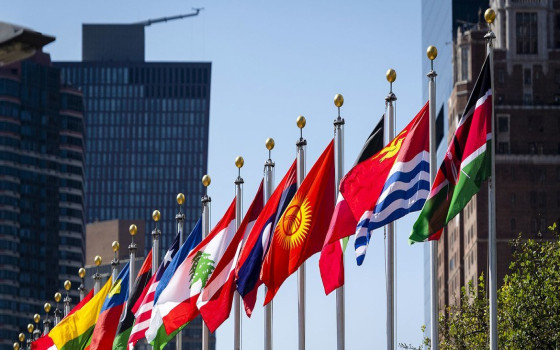
United Nations: The situation of civilians in armed conflicts in 2023 was extremely dire, especially in Gaza and Sudan

- Europe and Arabs
- Wednesday , 22 May 2024 16:12 PM GMT
Capitals: Europe and the Arabs
The Assistant Secretary-General for Humanitarian Affairs said the situation for civilians in armed conflicts in 2023 was “absolutely dire,” pointing to attacks in Israel, Gaza and Sudan. She stressed that the suffering inflicted on those affected by conflicts around the world last year indicates a disturbing lack of compliance with international humanitarian law and international human rights law.
Joyce Msuya's statements came in her briefing before a Security Council session held yesterday, Tuesday, on the protection of civilians in armed conflict, on the occasion of the 25th anniversary of the adoption of Security Council Resolution No. 1265 of 1999 on the protection of civilians in armed conflict.
Msuya stated that 2023 was the year in which “we witnessed the horrors of the attack launched by Hamas and other Palestinian armed groups on Israel on October 7, and the intense Israeli military response in Gaza that led to death, destruction and suffering at a pace and scale unprecedented in the recent past.” ". According to what was stated in the United Nations daily news broadcast, which we received a copy of today, Wednesday
She also pointed to the “brutal conflict” in Sudan where tens of thousands of civilians have been killed and injured, millions of people have been displaced, and acute food insecurity has worsened.
She explained that the United Nations recorded the death of more than 33,000 civilians in armed conflicts last year, which she described as a “huge number,” especially since the actual numbers are likely to be higher, which means a “horrific increase” of 72% compared to the previous year.
She noted the devastating impact of the use of explosive weapons in populated areas on civilians in many conflicts, who were also severely affected by the widespread destruction of vital infrastructure, as well as the forced displacement that was a “hallmark of armed conflicts.”
Msuya stressed that the harm and suffering inflicted on civilians in 2023 indicates that Security Council resolutions related to the protection of civilians over the past 25 years have largely not been paid attention to, calling for the adoption of a more comprehensive approach that takes into account the perspective of civilians and the complex, cumulative and long-term nature of all Damage to civilians in conflict.
Threat of genocide
Developments in the conflict in Sudan were the focus of a briefing by UN Special Adviser on the Prevention of Genocide, Alice Nderitu, who said that the current situation bore “signs of danger of genocide, with strong allegations that the crime has already been committed.”
Nderitu, who spoke via video, stressed that civilians are far from protection, adding that in Darfur and the city of El Fasher (North Darfur), civilians are attacked because of the color of their skin, ethnicity, and identity, and are also targeted with hate speech and direct incitement to violence.
She explained that the recent attacks reported in villages outside El Fasher bear “indications of the lack of military objectives or meaning to cause displacement and fear.”
She added that reports indicate that these attacks were characterized by indiscriminate violence, including sexual violence, looting of personal property from homes as well as market areas, destruction of residential and commercial buildings, theft of livestock and destruction of crops.
The UN official stressed that the humanitarian and human rights catastrophe unfolding in Sudan “constitutes a blight on our collective conscience. It also contradicts the essence of international obligations to prevent and punish crimes,” as stipulated in the Convention on the Prevention and Punishment of the Crime of Genocide.
She concluded her briefing by saying, “The protection of civilians in Sudan cannot wait. The threat of genocide exists in Sudan. It is real and grows every day.”
Civilians need action
The President of the International Committee of the Red Cross, Mirjana Spolijaric-Eger, also addressed the Council, calling on states to commit to full compliance with international humanitarian law and true collective responsibility for peace, to translate this into tangible and positive impact.
She added, "People caught in the clutches of armed conflict need actions, not words." She said that despite numerous resolutions adopted by the Security Council, "civilians have been attacked, displaced, violated, injured or killed through the most reprehensible methods."
She pointed out that there are more conflicts in which humanitarian action is prevented, and neutral and impartial providers of humanitarian assistance and protection, such as the International Committee of the Red Cross, are exposed to regular pressure to achieve political or military goals.
She expressed deep concern about the widespread dehumanization of people deprived of their liberty, many of whom continue to be subjected to inhumane treatment, torture, detention in poor conditions, cut off from their loved ones or used as political bargaining chips.
She also spoke about the threat posed by disappearing people, saying that when they are detained without registration and prevented from contacting their families, enforced disappearances are likely to rise, leading to “a significant increase in the number of people at risk of disappearance, as human remains are left under the rubble, Or on the battlefield, where they are buried in mass graves or crowded morgues without identification and without documents, where they are taken hostage and used as bargaining chips.”
She called on the Security Council to urge parties to respect international humanitarian law and Resolution 2474 to prevent people from disappearing in the first place. She also stressed that states must interpret and apply international humanitarian law in a way that “genuinely enhances” the protection of civilians on the ground.












No Comments Found